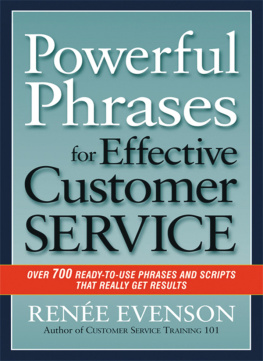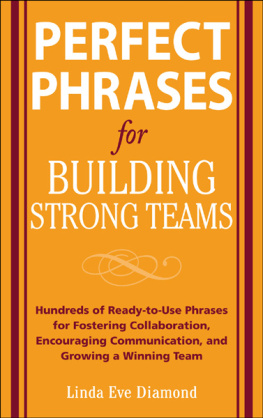Perfect Phrases for Business Proposals and Business Plans
Also available from McGraw-Hill
Perfect Phrases for Performance Reviewsby Douglas Max and Robert Bacal
Perfect Phrases for Performance Goalsby Douglas Max and Robert Bacal
Perfect Solutions for Difficult Employee Situationsby Sid Kemp
Perfect Phrases for Customer Serviceby Robert Bacal
Perfect Phrases for the Sales Callby William Brooks
Perfect Phrases for Executive Presentationsby Alan Perlman
Perfect Phrases for Business Proposals and Business Plans
Hundreds of Ready-to-Use Phrases for Winning New Clients, Launching New Products, and Getting the Funding You Need
Don Debelak


Copyright 2006 by The McGraw-Hill Companies, Inc. All rights reserved. Except as permitted under the United States Copyright Act of 1976, no part of this publication may be reproduced or distributed in any form or by any means, or stored in a database or retrieval system, without the prior written permission of the publisher.
The material in this eBook also appears in the print version of this title: ISBN: 978-0-07-145994-5, MHID: 0-07-145994-4.
All trademarks are trademarks of their respective owners. Rather than put a trademark symbol after every occurrence of a trademarked name, we use names in an editorial fashion only, and to the benefit of the trademark owner, with no intention of infringement of the trademark. Where such designations appear in this book, they have been printed with initial caps.
McGraw-Hill eBooks are available at special quantity discounts to use as premiums and sales promotions, or for use in corporate training programs. To contact a representative please e-mail us at bulksales@mcgraw-hill.com.
This publication is designed to provide accurate and authoritative information in regard to the subject matter covered. It is sold with the understanding that neither the author nor the publisher is engaged in rendering legal, accounting, or other professional services. If legal advice or other expert assistance is required, the services of a competent professional person should be sought.
From a Declaration of Principles jointly adopted by a Committee of the American Bar Association and a Committee of Publishers
TERMS OF USE
This is a copyrighted work and The McGraw-Hill Companies, Inc. (McGraw-Hill) and its licensors reserve all rights in and to the work. Use of this work is subject to these terms. Except as permitted under the Copyright Act of 1976 and the right to store and retrieve one copy of the work, you may not decompile, disassemble, reverse engineer, reproduce, modify, create derivative works based upon, transmit, distribute, disseminate, sell, publish or sublicense the work or any part of it without McGraw-Hills prior consent. You may use the work for your own noncommercial and personal use; any other use of the work is strictly prohibited. Your right to use the work may be terminated if you fail to comply with these terms.
THE WORK IS PROVIDED AS IS. McGRAW-HILL AND ITS LICENSORS MAKE NO GUARANTEES OR WARRANTIES AS TO THE ACCURACY, ADEQUACY OR COMPLETENESS OF OR RESULTS TO BE OBTAINED FROM USING THE WORK, INCLUDING ANY INFORMATION THAT CAN BE ACCESSED THROUGH THE WORK VIA HYPERLINK OR OTHERWISE, AND EXPRESSLY DISCLAIM ANY WARRANTY, EXPRESS OR IMPLIED, INCLUDING BUT NOT LIMITED TO IMPLIED WARRANTIES OF MERCHANTABILITY OR FITNESS FOR A PARTICULAR PURPOSE. McGraw-Hill and its licensors do not warrant or guarantee that the functions contained in the work will meet your requirements or that its operation will be uninterrupted or error free. Neither McGraw-Hill nor its licensors shall be liable to you or anyone else for any inaccuracy, error or omission, regardless of cause, in the work or for any damages resulting therefrom. McGraw-Hill has no responsibility for the content of any information accessed through the work. Under no circumstances shall McGraw-Hill and/or its licensors be liable for any indirect, incidental, special, punitive, consequential or similar damages that result from the use of or inability to use the work, even if any of them has been advised of the possibility of such damages. This limitation of liability shall apply to any claim or cause whatsoever whether such claim or cause arises in contract, tort or otherwise.
Contents
Preface
We live in a sound bite world today, in politics, in news, and increasingly in business. Sixty-page business plans are initially screened in five to 10 minutes and business proposals sell or dont sell in even less time. Bankers and investors scan plans and quickly capture their essence in three to four sentences:
ABCs space [the current popular term for market niche] is GPS (Global Positioning System) for truck fleets that allow fleets to provide their customers accurate tracking information. ABC sells equipment to fleets at cost, collecting per delivery tracking fees. ABCs edge is better tracking information than a Federal Express type system and an automatic e-mail system that advises customers of projected delivery dates. The extra cost to the trucker is $1.50 per delivery while ABCs per-delivery tracking costs are $0.75.
Writers of business proposals and business plans have two challenges:
 generate enough interest so their documents survive the initial screening process and
generate enough interest so their documents survive the initial screening process and
 convince people to accept and move forward on the actions requested by the proposal or plan.
convince people to accept and move forward on the actions requested by the proposal or plan.
This book will help readers create power paragraphs in their proposals and plans with high-impact phrases that can help them with both challenges. The power paragraphs are designed to quickly communicate a companys essential benefits in order to move past the initial screening process. The paragraphs and phrases are also designed to help pass the final evaluation of the target customer, investor, or other principal. Adding perfect phrases in each section of the document frames the section to the writers purpose and steers the reader to understand and accept the writers points.
The book is separated into two parts: business proposals and business plans. covers perfect phrases for business proposals. It is formatted to follow a typical scorecard, whether formal or informal, that clients or potential partners use when evaluating a plan. Part Two on business plans follows the same format as the business proposal section with each chapter covering a key item on the potential investors or banks scorecard. Each chapter deals with one of the items on the scorecard, offering phrases that position the business as a cant miss opportunity.
Finally, a formatting note: have black edges. This has been done purposely because these two chapters serve as the foundation for the perfect phrases sections on business plans and business presentations that follow. We added the black edges to make it easier for you to quickly refer to these chapters
This book is not meant to be a complete guide to writing a business proposal or plan. It is meant to add value to those documents by providing power paragraphs and phrases that quickly communicate points that will generate a positive response from readers. If you are writing a business proposal or plan for the first time you might also refer to a book that covers the basic points. Here are some of my favorites:
Next page





 generate enough interest so their documents survive the initial screening process and
generate enough interest so their documents survive the initial screening process and